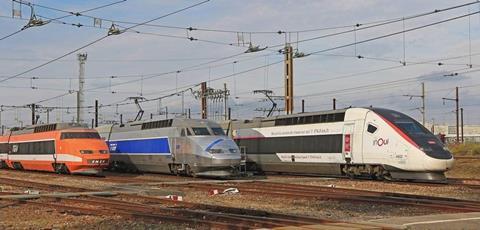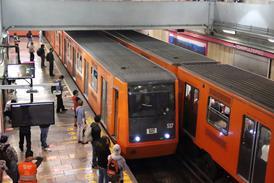
FRANCE: In a speech at Paris Gare de Lyon during an event held on September 17 to mark 40 years since the launch of TGV services, President Emmanuel Macron announced the revival of plans to expand the high speed network, describing the 2020s as ‘the decade of the TGV’.
Expansion has effectively been off the agenda since July 2017 when the president called for a ‘pause’ in construction of grands projets in the rail sector — this at the inauguration of LGV Sud-Europe Atlantique and LGV Bretagne-Pays de la Loire. Efforts would be focused instead on investment in the existing network, the president said at the time.
Macron’s speech at Paris-Lyon station means that policy has now changed. Standing in front of a full-scale TGV M power car mock-up, the president confirmed that €6∙5bn would be invested in three more TGV projects. Although these had been announced by Prime Minister Jean Castex on April 28 this year, Macron’s public endorsement of the schemes is significant.
Bienvenue au TGV du futur : le « TGV M » ! Déployé en France à partir de 2023, il sera plus accessible, plus connecté et plus écologique. pic.twitter.com/pFGR9NAZbb
— Emmanuel Macron (@EmmanuelMacron) September 17, 2021
Emphasising that the lines would be built sequentially, Macron named Bordeaux – Toulouse first, followed by Marseille – Nice and Montpellier – Perpignan, which itself will be phased with priority going to the Montpellier – Béziers section.
Without mentioning timescales, Macron also referred to the Lyon – Torino transalpine project ― for which initial works are already in hand ― as well as a Paris – Normandie high speed corridor and a Roissy – Picardie route. This appears now to be reduced to a 6∙5 km double-track spur from Vémars at the northern end of LGV Interconnexion to Marly-la-Ville on the Paris – Creil main line, plus upgrading of the line from Creil to Amiens; a public enquiry for this scheme was completed on April 6 this year.
The Paris – Normandie project will consist of new sections of line from Paris to Mantes-la-Jolie, Mantes-la-Jolie to Evreux, Rouen to Barentin, Barentin to Yvetot, plus a new station at Rouen Saint-Sever.
Macron also announced that two taxes applicable to high speed services, the Contribution de Solidarité Territoriale and the Taxe sur le Résultat des Entreprises Ferroviaires, would be withdrawn from 2023, saving SNCF around €200m a year. With the imminent arrival of Trenitalia’s open access high speed services twice a day on the Paris – Milano route, this decision had been sought by SNCF for some time.
Macron went on to describe the TGV as a ‘huge French adventure’, while SNCF President Jean-Pierre Farandou noted that it had been ‘an incredible commercial success’.
Alain Krakovitch, Managing Director of Voyages SNCF, took the opportunity to announce that Ouigo España would launch a Madrid – Valencia service in April 2022 and confirmed that SNCF was studying the possibility of launching Ouigo services in Italy in a ‘riposte’ to the launch of Trenitalia’s Milano – Paris service.
Macron’s announcements should perhaps be seen in the context of elections for the French presidency, due in April 2022.

















